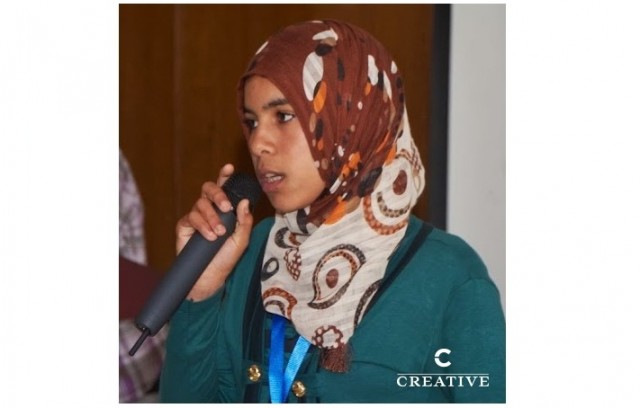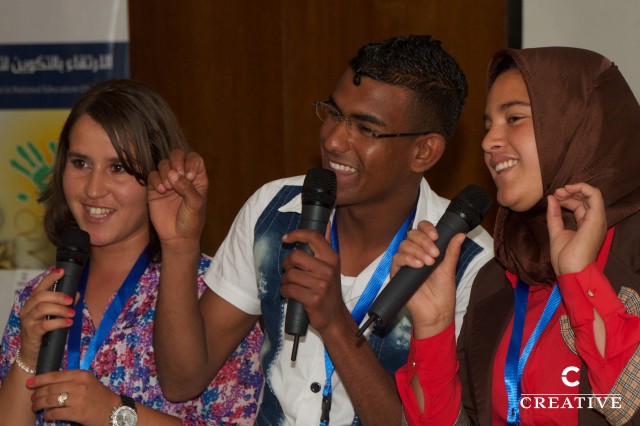Youth Speak promotes girls’ voices
By Maggie FarrandMarch 7, 2014

Rabat, Morocco – Souad Achehabou was a star student at her school in Jdour, a rural commune in Morocco’s Youssoufia province, 185 miles south of Rabat. She loved studying and was excited to go to school. But she lived far away and was regularly without reliable transportation. Many mornings, she would hitchhike. Worrying about her safety, her parents pressured her to drop out.
“I did not want to,” she said. “I like studying and was eager to continue.”
At times when she was kept home, she would send notes to the school pleading for help. Her teachers would occasionally respond by picking her up in the morning, and driving her home in the evening. But teachers weren’t always available, and pressure from her parents continued; before long, she became yet another middle school dropout.
For young girls in Morocco like Souad, dropping out of school is not uncommon. From 300,000 to 400,000 children discontinue their studies each year, more than half of whom are young girls. They cite a lack of safety and money, being discouraged by teachers and early marriage as reasons for leaving school.
That’s why in a recent youth-led research initiative that investigated the problem of middle school dropout, girls were given the opportunity to tell their stories.
Called Youth Speak and run by Creative Associates International, it selected middle school students who are personally affected by the problem to lead and conduct research with their peers and other stakeholders—a completely different approach to the adult-driven investigations.
In alignment with the Moroccan government’s efforts to reduce dropout rates, Youth Speak is part of USAID’s Improving Training for Quality Advancement in National Education project, which is implemented by Creative.
 Youth Speak focused on six communities that are the hardest hit by the scourge of dropout. Souad’s community of Jdour was one of those selected, and she became a youth researcher. Along with other investigators (half of them were girls), Souad and her fellow researchers interviewed more than 700 in-school and out-of-school youth and community members in the six geographic areas.
Youth Speak focused on six communities that are the hardest hit by the scourge of dropout. Souad’s community of Jdour was one of those selected, and she became a youth researcher. Along with other investigators (half of them were girls), Souad and her fellow researchers interviewed more than 700 in-school and out-of-school youth and community members in the six geographic areas.
Souad and the other researchers developed a survey, organized focus groups and conducted in-depth interviews.
Female participants were asked questions specifically related to girls in school and girls who had dropped out, such as early marriage, safety walking to and from school, family support and harassment. Results show the girls’ unhappiness with road safety and threats of sexual harassment; how their responsibilities around the house limits the time they have for their studies; and the pressure they face to drop out that their brothers or male classmates do not face.
Souad experienced those too: unsafe roads on her walk to school, and lack of support from her brother.
“My brother [said] that school was not necessary for girls and that good girls don’t travel so far away from home,” she said.
Of all the out-of-school girls surveyed, 80 percent expressed an interest in returning to school.
They worked with coaches, the Ministry of Education and Creative to present actions that schools, communities, families and the government could take to keep youth in school and transition them to work. Their findings were presented to local and national audiences.
The youth researchers provided recommendations like offering extracurricular activities, raising awareness at school of the consequences of not completing an education and encouraging more parental involvement in school activities.
Youth Speak validated students’ perspectives and made it possible for young girls to take a leading role in addressing the school dropout problem. In short, Youth Speak is a research carried out by youth, with youth and for youth.
The program saw impressive results among the team members: Within two months, every out-of-school youth researcher involved in Youth Speak had either returned to middle school or another formal education program—including Souad.
Now she has her parents’ support as she continues her education. She credits Youth Speak for saving her education, her future, and her life.
——————————
Maggie Farrand is a writer and editor at Creative Associates International in Washington, D.C.
